South Korea is a rapidly developing country in East Asia. Skyscrapers of business centers coexist in it with palaces and temples. A high level of economy allows tourists to receive all kinds of benefits of civilization, and natural resources will delight with the brightness of colors and picturesque landscapes.
Ancient history has left many historical monuments in Korea, and modernity is actively adding its interesting objects. The grandiose buildings of the Olympic Park, entertainment complexes and a 250-meter TV tower are of great interest to tourists. Shopping centers and colorful markets will diversify the program of the visit.
The long coastline of the peninsula offers a choice of beach holidays, both on it and on many neighboring islands. The country's thermal springs are also very popular. Korean traditional cuisine is popular all over the world and the opportunity to taste it locally is provided to every guest. The best time to visit the country is spring, the time of flowering.
What to see in South Korea?
The most interesting and beautiful places, photos and a brief description.
- Gyeongbokgung
- Rainbow Fountain Bridge
- Myeongdong street
- Republic of Korea War Memorial
- Seoul TV Tower (N Seoul Tower)
- Changdeokgung Palace
- Hwaseong Fortress
- Deoksugung Palace Complex
- Jongmyo Shrine
- Pomos Temple
- Bulguksa Buddhist Monastery
- Cheomseongdae Observatory
- Saraksan National Park
- Bukhansan National Park
- Demilitarized Zone (Korea)
- Olympic Park (Seoul)
- Jeju Island
- Jagalchi fish market
- Cheonggyecheon
- Everland amusement park
gyeongbokgung
The palace complex in Seoul is an open-air museum. Built in the 14th century for the ruling royal family of the Joseon Dynasty. Stores many valuable exhibits, including those from the list of national treasures. It is interesting for its bizarre architecture and landscape design of its park.
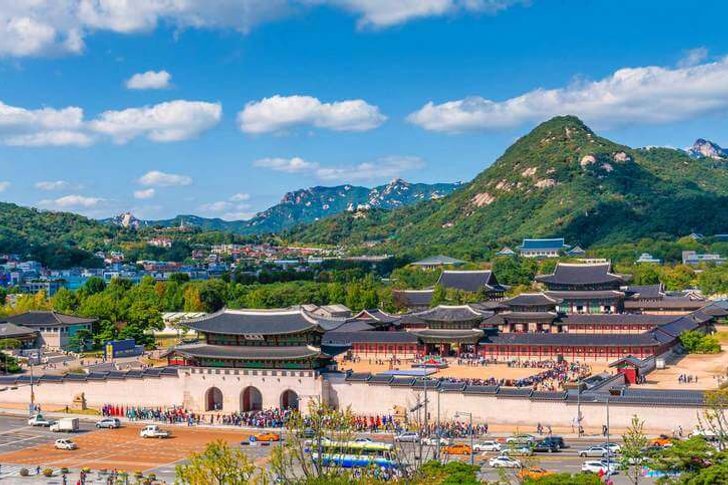
Address: 161 Sajik-ro, Sejongno, Jongno-gu, Seoul 03141, South Korea
Phone: +82 2-3700-3900
Opening hours: 09:00 - 18:00
Rainbow Fountain Bridge
The world's longest fountain bridge is located on the Hangang River. Fountains are arranged along its edges, forming water arches between the building and the river. The spectacle is impressive both day and night. At night, the jets of water are illuminated and acquire all the colors of the rainbow.

Address: Banpo-dong, Seocho-gu, Seoul, South Korea
Opening hours: 19:30 - 21:30
Myeongdong street
The central shopping street of the capital of South Korea. Large multi-brand stores and boutiques of famous international brands are located along its entire length. The best place for shopping. Small shops adjacent to the trading giants will provide an opportunity to choose souvenirs and plunge into the local flavor.
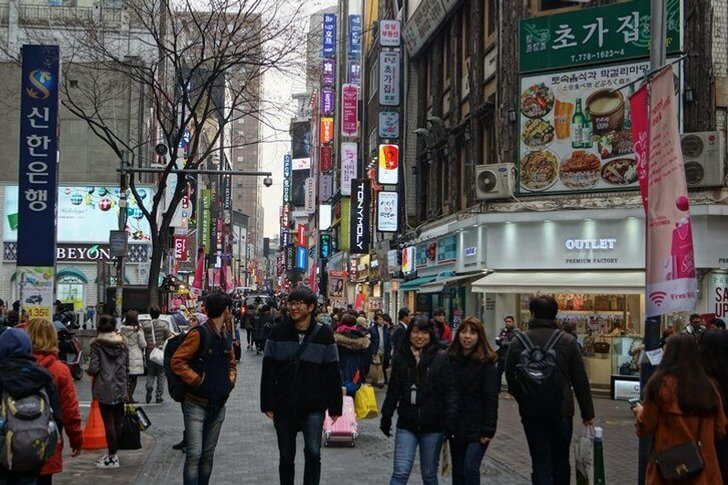
Address: Myeongdong, Seoul, South Korea
Opening hours: 10:00 - 22:00
Republic of Korea War Memorial
A whole complex of buildings dedicated to the military history of the country. Includes a museum building and equipped area around it. Inside there are 6 thematic halls dedicated to various aspects of the country's military past. Around the building you can see military equipment, memorials, sculptures, a park.
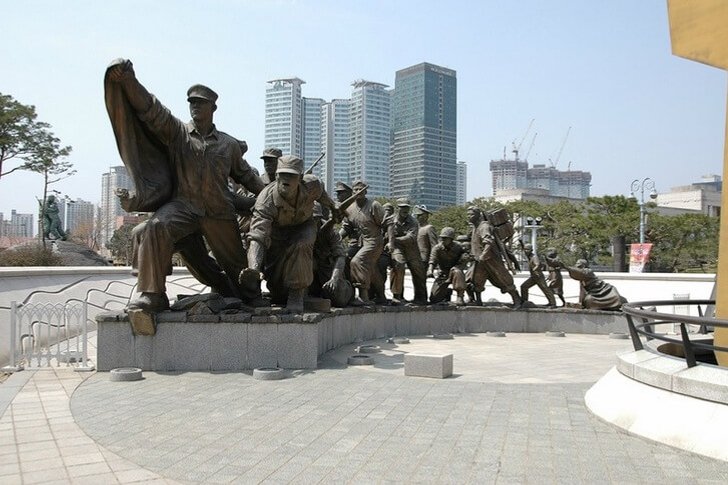
Address: 29 Itaewon-ro, Yongsan-gu, Seoul 04353, South Korea
Phone: +82 2-709-3114
Opening hours: 09:00 - 18:00
Seoul TV Tower (N Seoul Tower)
Located on Namsam Mountain, in the center of Seoul. The tallest building in the city. The symbol of modern Seoul and its number one attraction. It is an entertainment complex that has several viewing platforms, restaurants, souvenir shops, an observatory, a teddy bear museum and even a Wishing Pond.
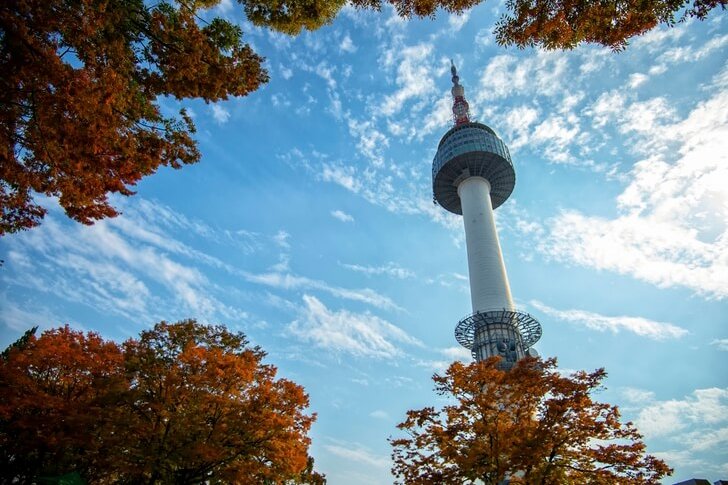
Address: 105 Namsangongwon-gil, Yongsan-gu, Seoul 04340, South Korea
Phone: +82 2-3455-9277
Opening hours: 10:00 - 23:00
Changdeokgung Palace
One of the Five Grand Palaces of Seoul - Included in the UNESCO World Heritage List. For four centuries the palace was the residence of the royal family. It is a beautiful architectural and park complex. The Secret Garden of Huwon Palace is a particularly popular attraction.
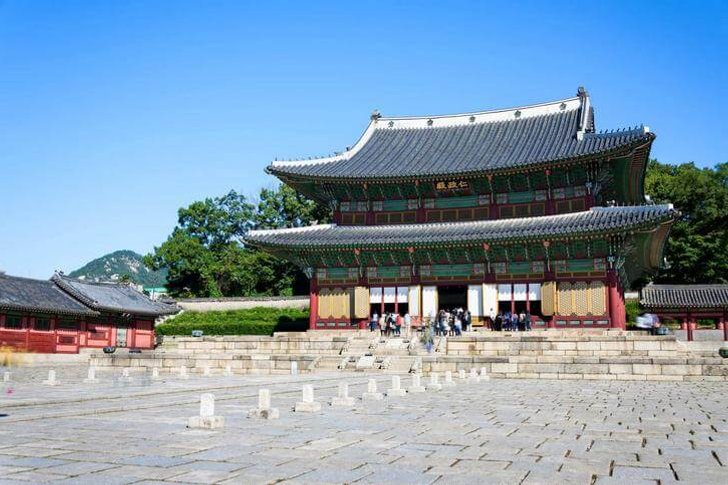
Address: 99 Yulgok-ro, Jongno-gu, Seoul 03072, South Korea
Phone: +82 2-762-8261
Opening hours: 09:00 - 18:00
Hwaseong Fortress
The majestic building on top of the hill is a unique example of defensive architecture. The fortress was built at the end of the 18th century, was destroyed and restored. It is currently a UNESCO protected site. It is a complex of towers, gates and long walls (their total length is 6 km).

Address: Nongseo-dong, Hwaseong-si, Gyeonggi-do, South Korea
Phone: +82 31-228-2752
Opening hours: 09:00 - 18:00
Deoksugung Palace Complex
One of the palace complexes in Seoul. At one time it was the official residence of the ruling dynasty. The palace and other buildings of Deoksugung are surrounded by a beautiful garden. Inside there are two large museums - Imperial and Arts.
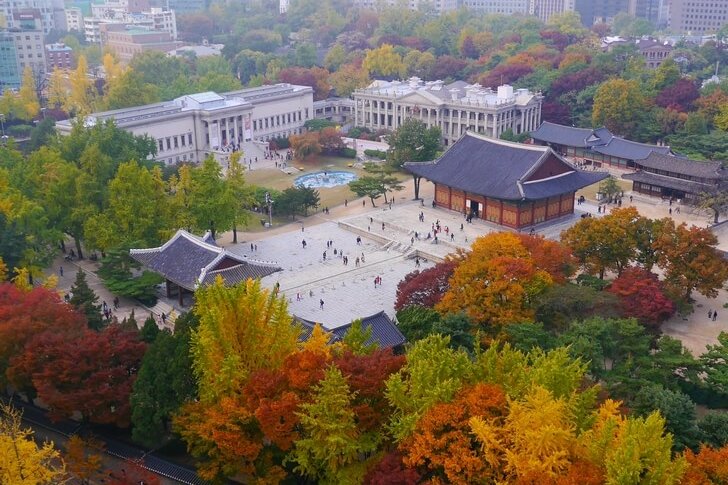
Address: 99 Sejong-daero, Taepyeongno 1-ga, Jung-gu, Seoul 04519, South Korea
Phone: +82 2-773-1090
Opening hours: 09:00 - 18:00
Jongmyo Shrine
Historical monument in Seoul. Place of burial rituals for members of the royal families. The oldest sanctuary of its kind, the longest building in Asia. Several generations of rulers and queens of Korea are buried here.

Address: 157 Jongno, Jongno-gu, Seoul 03161, South Korea
Phone: +82 2-765-1775
Opening hours: 09:00 - 18:00
Pomos Temple
An ancient Buddhist temple, one of the largest in Korea. Located on Mount Komodjon, near the town of Pomos. Some objects of the complex have more than a thousand years of history. There are 160 buildings in the traditional architectural style of the Joseon Dynasty on an area of 8 km².
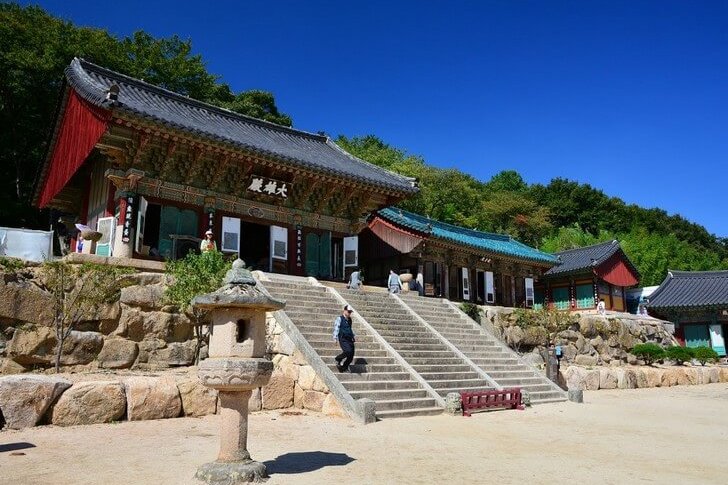
Address: 1734-1 Dongguk-ro, Geochang-gun, South Korea
Phone: +82 55-945-4700
Opening hours: 09:00 - 17:00
Bulguksa Buddhist Monastery
The most famous and ancient Buddhist temple complex in Korea, protected by UNESCO. On the territory of the complex there are seven objects included in the list of National Treasures. These include pagodas, bridges, statues. There is a beautiful park around.
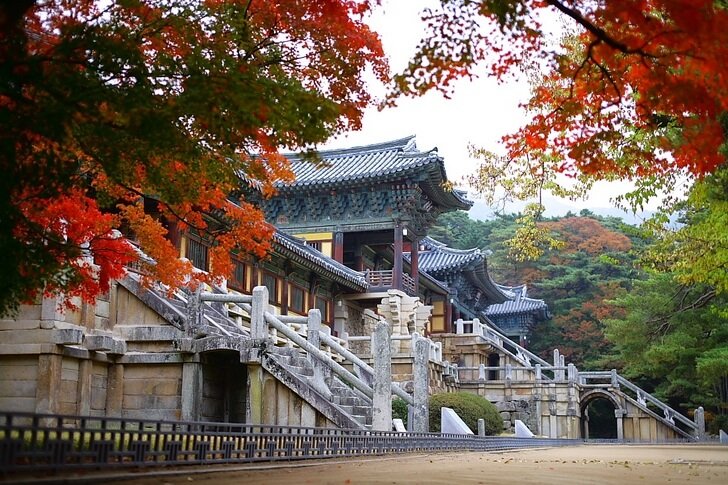
Address: 385 Bulguksa-ro, Gyeongju, South Korea
Phone: +82 54-746-9093
Opening hours: 09:00 - 18:00
Cheomseongdae Observatory
One of the country's national treasures. It is the oldest scientific building in the world. Built in the 7th century to observe the stars. The height of the stone tower is a little less than 10 meters. Located in the city of Gyeongju.
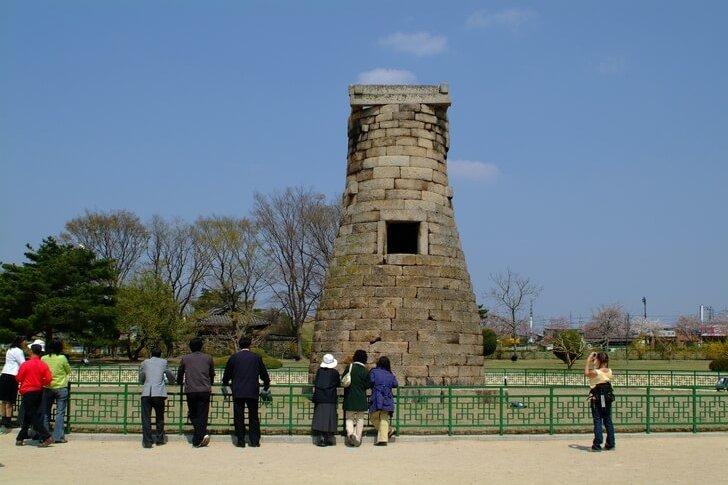
Address: 102-2 Noseo-dong, Gyeongju, South Korea
Phone: +82 54-749-7200
Opening hours: 09:00 - 18:00
Saraksan National Park
UNESCO Biosphere Reserve. It contains rocks, waterfalls, hot thermal springs, Buddhist temples. Large in area, divided into three parts. Many organized tourist routes (paths). There are places for overnight stays, hotels and catering points.

Address: Sarak-san, Yangyang-gun, Gangwon-do, South Korea
Phone: +82 33-670-2211
Opening hours: 06:00 - 20:00
Bukhansan National Park
A natural oasis within the city, a favorite vacation spot for locals and tourists. It is a mountainous landscape covered with forest. It is home to many birds and rare plants. The views are picturesque. There are also many Buddhist temples in the park.
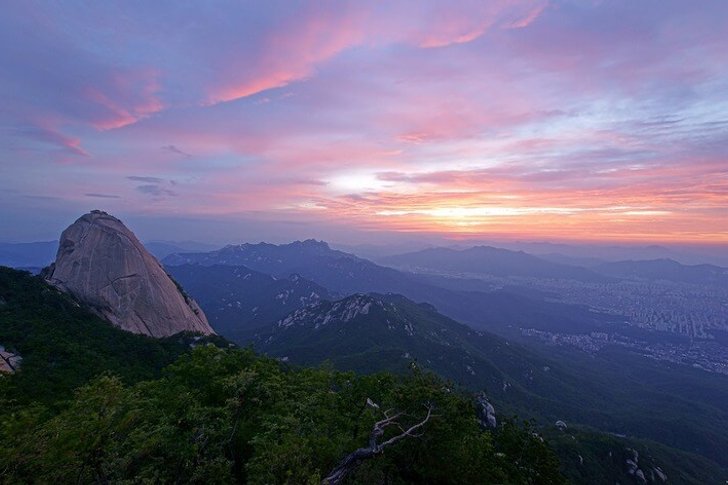
Address: Bukhansan National Park, Seoul, South Korea
Phone: +82 2-909-0494
Opening hours: 06:00 - 18:00
Demilitarized Zone (Korea)
A special protected object is the border between South and North Korea. It is a solid concrete wall reinforced with additional protection. A special site has been equipped for tourists, which allows you to personally explore the fortification and even look through binoculars at the "northern neighbor".
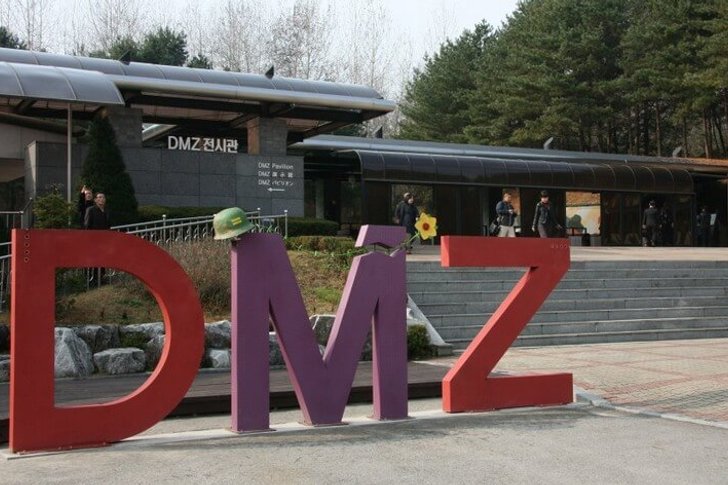
Address: Panmunjom, Gyeonggi-do, South Korea
Opening hours: 09:00 - 16:00
Olympic Park (Seoul)
A complex of sports facilities located in the park. It was built for the 1988 Olympics. Museums, a sculpture park, a musical fountain, an ancient fortress and an artificial lake are located on a large green area. A place for active sports and recreation.
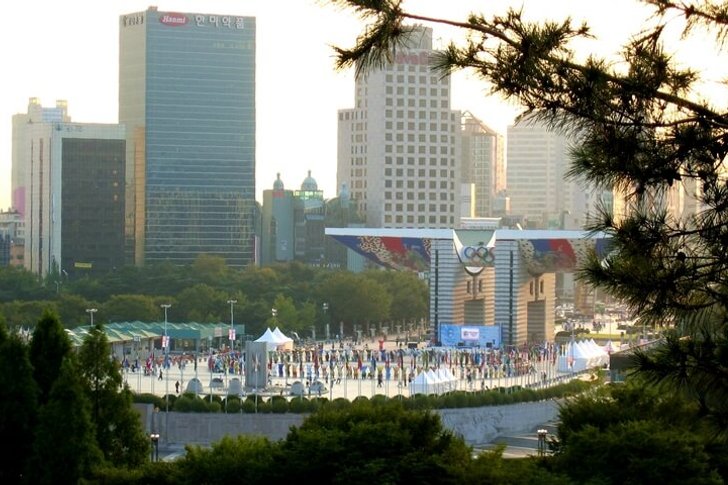
Address: 424 Olympic-ro, Songpa-gu, Seoul 05540, South Korea
Phone: +82 2-410-1114
Opening hours: 05:00 - 22:00
Jeju Island
The largest island of South Korea, is a separate province. Volcanic origin, has a peculiar landscape and nature. It has a unique microclimate - this is the southernmost part of the country, there are excellent beaches. An attractive object for tourists, very popular with honeymooners.
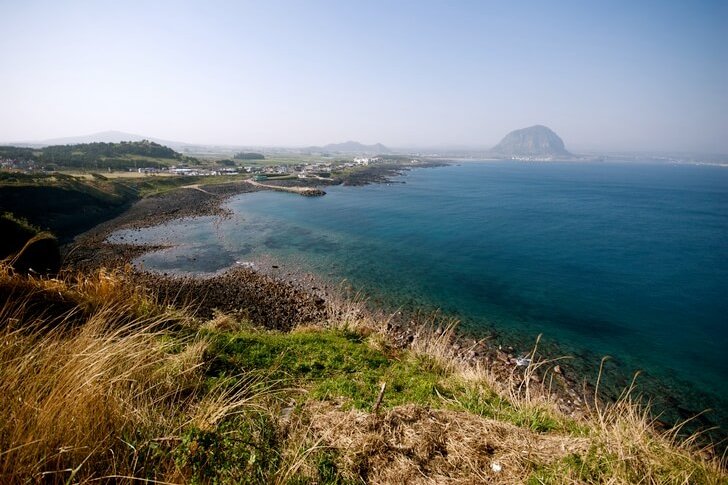
Address: Jeju Island, South Korea
Opening hours: 24/7
Jagalchi fish market
One of the largest fish markets not only in Korea, but throughout Asia. Located in Busan city. Nearly a hundred years of history. A modern high-rise building, part of the area given to merchants, part - for restaurants and offices. Many shops are still located on the street, and allow you to feel the specifics of the fish market of the past.

Address: 52 Jagalchi-ro, Busan, South Korea
Phone: +82 51-245-2257
Opening hours: 05:00 - 22:00
cheonggyecheon
Walking area in the center of Seoul, arranged along the banks of the stream. The water artery has always been here, but was in a deplorable state. After the renovation, Cheonggyecheon turned into a long, cozy park in the heart of the capital. Ten kilometers of the embankment are decorated with decorative elements, landscape "oases", fountains. The stream bed looks very impressive in the dark, as the water cascades are highlighted.
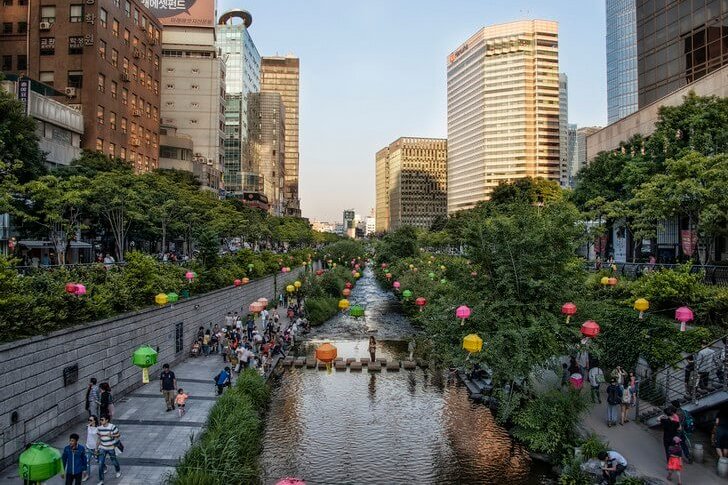
Address: Cheonggyecheon-ro, Jongno-gu, Seoul, South Korea
Opening hours: 24 hours
Everland amusement park
Located in the suburbs of Seoul, the largest in Korea. It is a large modern entertainment complex, including attractions, a zoo, a water park. Each zone has unique characteristics and attracts a huge number of tourists. In the season, a grand flower festival is held here.
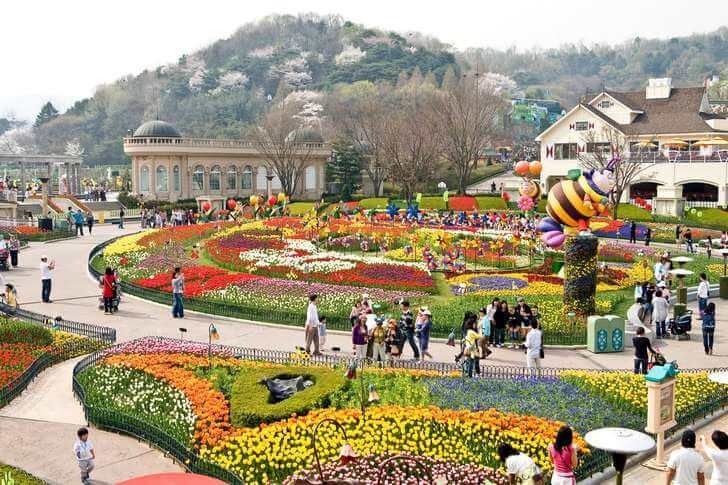
Address: 199 Everland-ro, Pogok-eup, Cheoin-gu, Yongin-si, Gyeonggi-do, South Korea
Phone: +82 31-320-5000
Opening hours: 10:00 - 22:00